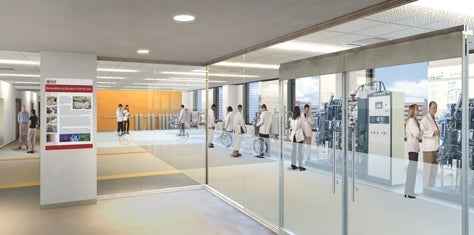About five years ago when Polaroid announced plans to close its Waltham manufacturing plant and leave dozens of skilled workers without jobs, Worcester Polytechnic Institute sprang into action.
Looking for a way to transfer the talents of chemical workers from the film company to other fields, state officials began reaching out to businesses and educational institutions to see if there were ways to retrain some of the displaced workers.
WPI seized the opportunity. Working with Bristol-Myers Squibb — the national pharmaceutical company that has operations in Devens — WPI created a program to train the former Polaroid workers in biomanufacturing.
About 20 former workers took a multi-week training program and all but one of the students landed a biotech job after the course. Since then, 85 former Polaroid workers have been trained at WPI in biomanufacturing.
So began WPI’s foray into biomanufacturing job training certificate programs.
Next year, WPI will significantly ramp up its job training in the life sciences field by opening a brand new and expanded site for its Biomanufacturing Education and Training Center (BETC) at the next building in Gateway Park, which is already under construction.
And biotech companies couldn’t be happier. Recently, college officials got initial commitments of support from three major biotech players to help support the new center, including BMS, Shire Human Genetic Therapies and Abbott Laboratories.
“We’re creating a pipeline of human capital,” said Stephen Flavin, WPI’s vice president and dean of academic and corporate development.
And for companies in the biotech field, that is the lifeblood of their operations.
Helping Hand
Shire Pharmaceuticals has had relationships with many educational institutions over the years, according to William Ciambrone, senior vice president of technical operations for Shire Human Genetic Therapies, a division of the larger company.
Through these programs, Shire officials have donated equipment and staff hours to offer guidance on curriculum.
One of the most important roles companies can play is keeping educational institutions abreast of the latest developments in the industry, said Ciambrone, who works in Cambridge and Lexington.
“Without these partnerships, the curriculum can become stale,” he said.
The new BETC will be a good place to train the students, he said. WPI currently has a 1,500-square-foot facility for its biomanufacturing center with a 50-liter bioreactor, a machine used in biomanufacturing. The new BETC will be a 10,000-square-foot facility with more than four-times the bioreactor capacity.
WPI is able to make the commitment because biotech companies are going to need the workers in the coming years.
Shire is in the midst of constructing a $400- million expansion of its Lexington campus off of Route 2 near the intersection of Interstate 95. A large sign stands directly outside the building with the words, “We’re Hiring.”
Private industries aren’t the only partners these programs rely on. The state and federal government have provided funding in the past to support job-training initiatives as well.
State Support
Mount Wachusett Community College in Gardner received a $1.6-million grant from the U.S. Department of Labor in 2008 to support the college’s job training program. That pays for an 11-week, 21-hour-a-week certificate program for biomanufacturing, according to John Henshaw, senior special programs coordinator at MWCC, who heads up the school’s training programs.
In addition to the certificate program, the school also offers a one-year certificate and a two-year associate’s degree.
But the three-year grant is running out this year, which means the school will not be able to subsidize the tuition to as many students moving forward. The money was most useful when setting up the program, Henshaw said, and the program will continue to receive support from the private sector.
BMS has donated equipment to the program, while a Genzyme official sits on the program’s board of directors. Each year students in the program tour Lonza, a biopharmaceutical manufacturing company with a site in Hopkinton.
Not all students who attend one of the programs offered by the schools get a job, Henshaw said, but it “gives them a leg up in the hiring process.”
Ciambrone agreed.
There are no guarantees for jobs, he said, but students who have job training through the courses have a familiarity with different aspects of biomanufacturing. That ranges from quality assurance to cell culture development.
Another popular landing spot for graduates are biomanufacturing supply companies, Henshaw said. Students can get jobs at businesses that supply parts, services or products to biotech firms that make therapies.
“These graduates still need some on-the-job training, but it is much less than if we were to hire someone who has not taken the program,” Ciambrone said. “When we get a candidate that has hands-on experience because of these programs, they have a familiarity, a comfort in doing this work, and that is training that we don’t have to do.”

